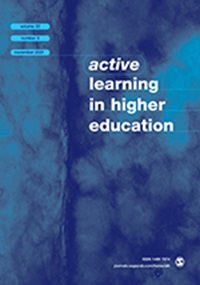“为什么批判性思维这么难?”与国际高等教育学生探讨影响批判性思维的因素
IF 3.2
1区 教育学
Q1 EDUCATION & EDUCATIONAL RESEARCH
引用次数: 2
摘要
所有学科的大学生都应该表现出批判性思维。然而,批判性思维可能会受到心理和社会学因素的阻碍,如:信仰和确认偏见、框架、社会压力,以及对概率和风险的评估不力。这些因素很少(如果有的话)在学生学科的背景之外被孤立地彻底检查。因此,本研究的目的是确定学生是否发现他们的批判性思维得益于对这些因素的更好理解。为此,根据积极学习原则设计了一系列研讨会,探讨了影响批判性思维的人为因素。这些研讨会是为在英国谢菲尔德大学学习各个学科的国际学生举办的,参与者随后接受了采访。使用专题分析和代码开发对所得数据进行了分析。与会者报告说,由于举办了这些讲习班,他们对提问和分析的批判性思维技能有了更好的理解,使用了多种视角和论点构建;以及对确认偏见、证据和来源的使用、框架、独立思维和与批判性思维相关的文化的新认识。特别是,来自支持确定性和权威性的教育传统的学生表现出对模糊性的更大容忍度,并愿意自己判断。还有证据表明,与自我(如自我意识)和他人(如尊重他人观点)以及批判性(即对自己在社会中的角色的认识)有关的批判性倾向也在发展。这表明,更好地理解影响人类思维过程的因素会培养学生成为批判性思想家,并使他们能够为世界做出积极贡献。本文章由计算机程序翻译,如有差异,请以英文原文为准。
‘Why is this hard, to have critical thinking?’ Exploring the factors affecting critical thinking with international higher education students
University students of all disciplines are expected to display critical thinking. Critical thinking may, however, be impeded by psychological and sociological factors such as: belief and confirmation biases, framing, social pressure to conform and poor assessment of probability and risk. These factors are rarely, if ever, thoroughly examined in isolation, outside the context of the students’ discipline. The aim of this study therefore was to ascertain whether students found that their critical thinking benefited from a better understanding of these factors. To this end, a series of workshops was designed along active learning principles which explored the human factors affecting critical thinking. These workshops were delivered to international students studying various disciplines at the University of Sheffield in the UK, and the participants were then interviewed. The resulting data was analysed using thematic analysis and code development. Participants reported as a result of these workshops an improved understanding of the critical thinking skills of questioning and analysing, using multiple perspectives and argument building; and new awareness of confirmation bias, the use of evidence and sources, framing, independent thinking and culture in relation to critical thinking. In particular, students from educational traditions that favour certainty and authority showed greater tolerance of ambiguity and willingness to judge for themselves. There was also evidence of development in critical dispositions relating to the self (such as self-awareness) and to other people (such as respect for others’ views) as well as criticality, that is, awareness of one’s role in society. This suggests that a better understanding of the factors that influence human thought processes develops students as critical thinkers and equips them to make a positive contribution to the world.
求助全文
通过发布文献求助,成功后即可免费获取论文全文。
去求助
来源期刊

Active Learning in Higher Education
EDUCATION & EDUCATIONAL RESEARCH-
CiteScore
13.20
自引率
12.00%
发文量
31
期刊介绍:
Active Learning in Higher Education is an international, refereed publication for all those who teach and support learning in higher education (HE) and those who undertake or use research into effective learning, teaching and assessment in universities and colleges. The journal is devoted to publishing accounts of research covering all aspects of learning and teaching concerning adults in higher education. Non-discipline specific and non-context/country specific in nature, it comprises accounts of research across all areas of the curriculum; accounts which are relevant to faculty and others involved in learning and teaching in all disciplines, in all countries.
 求助内容:
求助内容: 应助结果提醒方式:
应助结果提醒方式:


